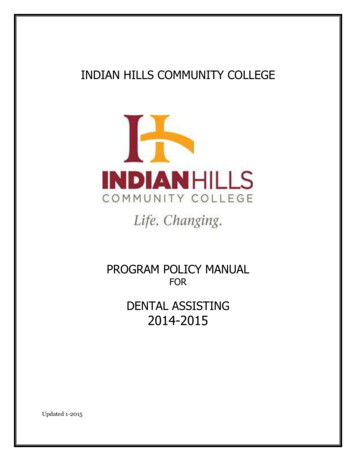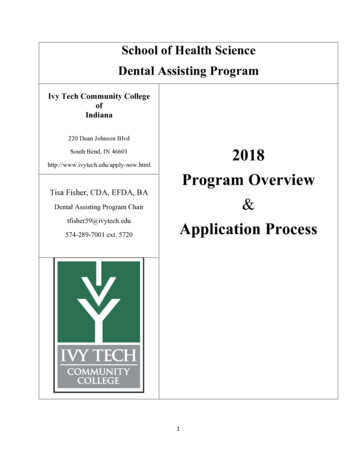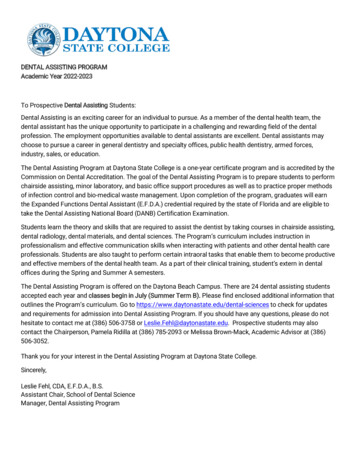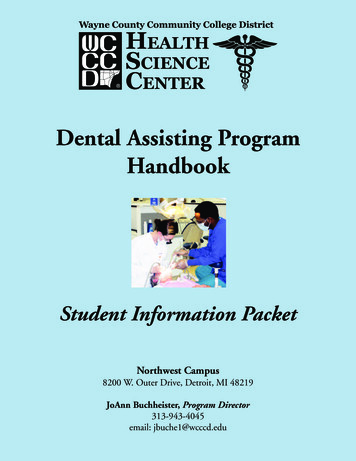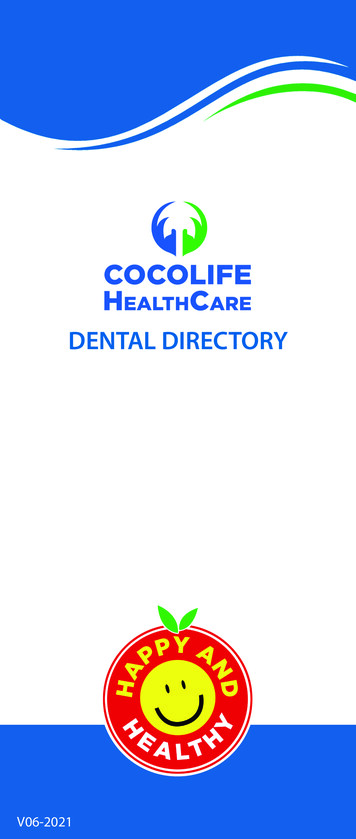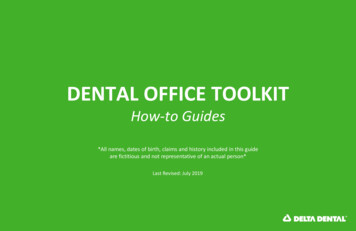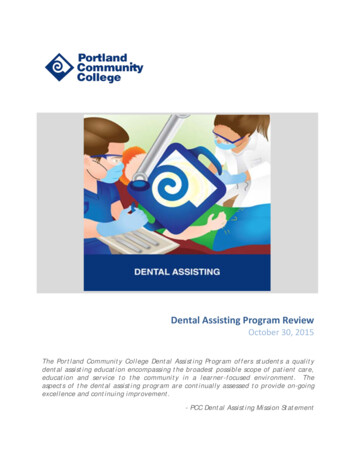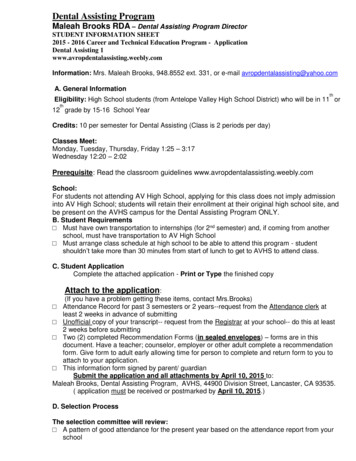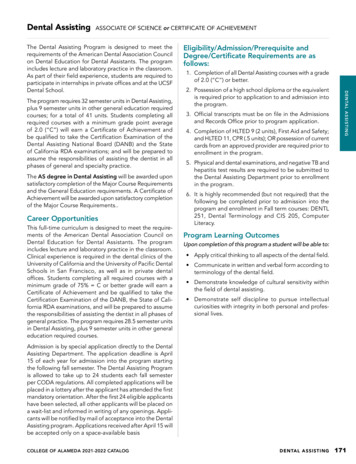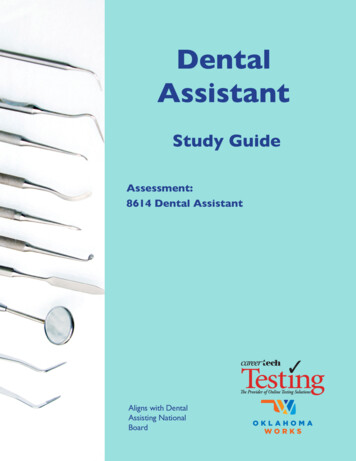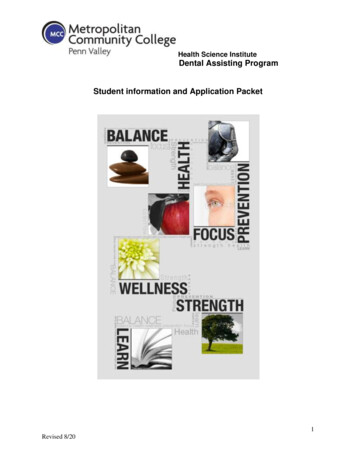
Transcription
Health Science InstituteDental Assisting ProgramStudent information and Application Packet1Revised 8/20
Health Science InstituteDental Assisting ProgramThank you for your interest in the Dental Assisting Program.The Dental Assisting Program is accredited by the Commission on DentalAccreditation (CODA) since 1999 which is nationally recognized by theUnited States Department of Education (USDE) to accredit dental and dentalrelated education programs conducted at the post-secondary level and islocated at 211 East Chicago Ave. Chicago, IL 60611-2678 and the website ishttp://www.ada.org/117.aspx.Graduates of the program will be able to sit for the national certificationexamination for the dental assisting administered by the Dental Assisting NationalBoard 444 N. Michigan Ave., Suite 900 Chicago, IL 60611, 312-642-3368. Aftersuccessful completion of this exam, the individual will be a Certified DentalAssistant (CDA). Most states require licensure in order to practice; however statelicenses are usually based on the results of the DANB Certification Examination. Afelony conviction may affect a graduate’s ability to sit for the DANB CertificationExamination.Dental Assisting is listed as the fifth highest profession that is expected to grow ata faster than average pace through the year 2016 by the US Department of Labor’sOccupational Outlook Handbook lists (www.bls.gov). The field of DentalAssisting is exciting, diverse and rewarding. DANB’s certification and competencyexams are currently recognized or required by 38 states, the District of Columbia,the U.S. Air Force and the Department of Veterans Affairs to perform expandedfunctions or expose radiographs. Other benefits of DANB certification are jobmobility, greater earning power, professional advantage, peer recognition andenhanced employment opportunities. Job placement for graduates has been 100%.This packet includes all the information you will need to apply to the program.After reviewing this information, if you have more questions please call (816) 604-4237.Good luck with your educational pursuit.2Revised 8/20
Health Science InstituteDental Assisting ProgramGeneral InformationDental Assisting as a Career: Excellent employment opportunities in a variety of settings Competitive salary, approximates 32,000 – 35,000 for new graduates Opportunity to work with people of all ages with different needs A fulfilling profession that allows you to help others live independent andpurposeful livesDental Assisting Program Overview: DENA 100: Intro to Dental Assisting course is open to the public interestedin learning about the field. For students who intend to apply are stronglyencouraged to have DENA100 completed or currently enrolled Students must apply to and be accepted to the program Accredited by the Commission on Dental Accreditation (CODA) since 1999 The certificate program is 1 year in length, once accepted, with a total of 53credit hours The Associate of Applied Science degree program is two-year long, onceaccepted, with a total of 73-78 credit hours The program is full time with all classes and outside requirements occurringduring daytime, weekday hours Offers 300 hours of clinical experience Excellent reputation for quality education within the healthcare community Affiliate program with Johnson County Community College and KansasCity Kansas Community College Articulation agreement with University of Missouri Kansas City School ofDentistry (Pending for next renewal)3Revised 8/20
Health Science InstituteDental Assisting ProgramStudent Requirements: Maintain CPR certification (obtained first semester of program) Complete physical exam to include TB test yearly (once accepted toprogram) Submit proof of required vaccinations and maintain health record Obtain Hepatitis B vaccination or sign a waiver Receive a “C” grade or better in all coursework Purchase Liability Insurance through the college every semester Students will be required to submit to a drug screen as per the requirementsof the clinical fieldwork sites.Please see the attached statement regarding this requirement.Criminal Background Check (CBC): Clinical sites require that only students withan acceptable consumer report, as it relates to criminal background, be allowed toparticipate in clinical rotations. Therefore, prior to commencing the clinical portionof your program, MCC will have Validity Screening Solutions, a credit reportingagency, conduct a criminal background check. You are responsible for completingthe required application information with the credit reporting agency and payingthe cost. Criminal background checks are normally conducted once during theprogram; however, some clinical sites may require a more current report.MCC shall not use the results of a background check as criteria for admission toany program or course. However, you should know that you will not be able toobtain a license to practice or be allowed to participate in clinicals should you havean unacceptable background as defined by state law regarding health careproviders. An unacceptable background includes a felony and/or class "A"misdemeanor conviction.4Revised 8/20
Health Science InstituteDental Assisting ProgramAnswers to Frequently Asked Questions:1. What about opportunities to earn a two-year or four-year degree?All courses required for our dental assistant certificate program are also required for theassociate's degree, making it easy to continue your education. In addition, we havepartnerships with the dental hygiene programs at Johnson County Community College andthe University of Missouri-Kansas City (UMKC).2. What kind of training will I receive?Our program features 300 hours of hands-on training at both community clinics and theUMKC School of Dentistry. At UMKC, you'll work alongside dental students, providing careto actual patients. In addition, students admitted in our program will be offered training inExpanded Function Dental assistant duties from the Missouri dental board in four categories,Restorative I, Removable Prosthodontics, Fixed Prosthodontics and Orthodontics.For more information: https://www.moefda.org/3. What is the difference between a dental assistant and a dental hygienist?A dental assistant works directly with the dentist. Duties vary according to the state andinclude setting up for various dental procedures, suctioning, transferring of instruments andmixing materials. A dental assistant also takes radiographs, impressions and provides patienteducation. A dental hygienist’s duties include cleaning teeth, provide local anesthesia,perform nonsurgical periodontal therapy as well as perform head and neck examinations.4. What's the job outlook for someone in the dental assisting field?In one word: terrific! There is a labor shortage and dentists are always looking for welltrained dental assistants. In fact, most of our students already have jobs by the time theygraduate. ook.aspx5Revised 8/20
Health Science InstituteDental Assisting Program5. When will I know if I’ve been accepted?The deadline for applications is Feb 15th. Students are contacted in early March to inform themof their acceptance/non-acceptance into the program. The letter will inform you of when toattend the mandatory orientation which is held prior to the first day of school.6. Is the dental assisting program full-time?The program is full-time with classes meeting during the day all days of the week, excludingevenings and weekends. The program requires full-time attendance.7. Do I need to take COLL 100 course?COLL 100 is required for all students who have not already completed at least 12 college creditswith at least a 2.0 GPA6Revised 8/20
Health Science InstituteDental Assisting ProgramAdmissions Requirements1. The MCC admission application should be completed online atwww.mcckc.edu. Select Get Started and follow the steps to apply.2. Arrange for transcripts to be sent to MCC,Attn: Business and Registration Center,3201 Southwest Trafficway,Kansas City, MO 64111And also, to the Dental Assisting (DA) Program (See page 7 for addressinformation).The Student Data Center will determine course equivalencies and post them to thetranscript. Include copies of high school transcripts, GED and any collegetranscripts for the student data center. You do not need to send high schooltranscripts or GED reports to the DA program nor do you need to have an officialMCC transcript sent to the program. Transcripts from colleges other than MCC doneed to be sent to the DA program as well as the student data center.Please note that it may take a few weeks for transcripts from other colleges to besent and received. Therefore, do not wait too long to send transcripts as they maynot be received by the Feb 15th deadline and thus affect your application status.3. If you require Allied Health Advising or Counseling (not required), contactan advisor at MCC by calling 816-604-1000. Johnson County CommunityCollege students can contact 913-469-8500. Kansas City Kansas CommunityCollege (KCKCC) students can contact Dean of the Division of HealthProfessions at (913) 288-7126.4. Students are admitted into the dental assisting program during the summersemester and must meet the following requirements prior to admittance: Achieve placement score minimum if required (see information on next page)COLL 100 or HLSC 100 (if less than 12 credit hours already earned)DENA 100 Introduction to Dental Assisting (In person)ENGL 101 Composition & Reading (3 Cr.)o JCCC students take ENGL 121 (3 Cr.)o KCKCC students take ENGL 101 (3 Cr.)7Revised 8/20
Health Science InstituteDental Assisting Program Complete an application to Metropolitan Community College; includeoriginal high school and college transcripts. Complete and submit the application to the dental assisting program, alongwith copies of high school and college transcripts, no later than Feb 15th Successfully completion of prerequisite courses with a grade of “C” or betterino ENGL 101 (Must have completed) ando DENA 100 (Must have completed or currently enrolled in DENA100) Applicants must email Hema.udupa@mcckc.edu orTerry.McDaniel@mcckc.edu to schedule a time to meet with the DentalAssisting Program Coordinator for application review process prior to Feb15th to assure students understand the requirements and rigor of the full timeday program.Complete a Dental Assisting in-class or in-lab observation. Observationsmust be within the past six months of the application deadline. Observationopportunities are available during normal class hours 8:00am-4:30pm viazoom due to COVID-19. To secure a date and time for an observationcontact Mrs. Terry McDaniel by e-mail (terry.mcdaniel@mcckc.edu) orDr.Udupa (Hema.Udupa@mcckc.edu) Note: On the day of your scheduledobservation, please log in 5 minutes early and wait for the instructor to setup the in-class/in-lab observation. You will be emailed the observation formand course/lab details that you will be observing. At the completion of theobservation, complete the observation form and email it immediately to theinstructor (Hema.Udupa@mcckc.edu). This form must be submitted with theprogram application.5. Download the application packet s/Dental Assisting ApplicationPacket.pdf6. Complete a 2 paged Paper (double spaced, 12-point font, 1-inch margins)addressing the following content. The paper will be evaluated for writingskills and will impact your selection for the program.8Revised 8/20
Health Science InstituteDental Assisting ProgramInclude in your paper the following:a. Your definition of Dental Assisting and your reasons forchoosing the field. Include which areas of Dentistry you areinterested in, any experiences you have had with Dentalassisting either personally or professionally, also why you feelyou would be a good candidate for the field of DA and theprogram. Use information you gained from DENA 100 as wellas your own research to write this section.b. Your well-developed plan for managing your time while in theprogram. How will you juggle work, family and school ifneeded to ensure that your coursework and fieldwork are givenfull attention. How will you study and prepare for the classes.7. Fill out the Curriculum Checklist by identifying the courses you have takenand the grade you received in each course.8. The minimum GPA for admission is a 2.5.9. Copy of your most current Official Transcripts (non-MCC) reflecting thecourses you have taken that are relevant to your acceptance into the DENAprogram. Please know it can take a few weeks for colleges and universitiesto send transcripts and a few weeks as well for the student data center toevaluate them. (see #2)10. Complete and submit the application to the dental assisting program, alongwith copies of high school and college transcripts, no later than Feb 15th.Send the application to:Dental Assisting Program,Health Science Institute/ MCC-PV,3444 Broadway, KCMO 64111or drop off the completed application to :The Division SecretaryHealth Science Institute, Room 410(4th floor)3444 Broadway, KCMO 64111.(816)604-42329Revised 8/20
Health Science InstituteDental Assisting ProgramIf you require academic advising, please contact one of the following MCC-Penn ValleyAdvisors (816)604-1000 or pv.advisor@mcckc.edu to discuss your needs. JohnsonCounty Community College students can contact at (913) 469-8500.11. A valid e-mail must be provided on the application as students will beinformed of their status with the program via e-mail. Students can expect tolearn of their acceptance or non-acceptance within 2 to 3 weeks after Feb15th.12. Students accepted into the DA Program will be invited to a MANDATORYorientation mid-April. Do not try to enroll in any course prior to thisorientation session.13. At the orientation session, students will receive the summer class schedulefor the Dental Assisting Program, information regarding CastleBranch/Immunization requirements, List of textbooks for the DA program,place order and pay for the DA program uniform/scrubs and safety glasses.10Revised 8/20
Health Science InstituteDental Assisting Program11Revised 8/20
Health Science InstituteDental Assisting ProgramClass locations:Most classes will be held at the Health Science Institute of MCC-Penn Valley,however some coursework and clinical will be held at the clinical sites and he/shewill be expected to adhere to the guidelines and regulations established by Clinicalsites.Metropolitan Community College is committed to a policy of nondiscrimination on the basis of race,color, religion, sex, sexual orientation, age, birth, ancestry, national origin, or disability in admissions;educational programs, services or activities; and employment, as specified by federal laws Title VI, TitleVII, Title IX, Section 504, the Americans with Disabilities Act, and state laws and esus/diversity/nondiscrimination.asp)A Summary of Your Rights under the Fair Credit Reporting ActMetropolitan Community College: Criminal Background Checks (CBCs) forAllied Health, Nursing and Continuing Education Programs Clinical sites require that only students with an acceptable consumer report, as itrelates to criminal background, be allowed to participate in clinical rotations.Therefore, prior to commencing the clinical portion of your program, MetropolitanCommunity College (MCC) will have Validity Screening Solutions, a creditreporting agency, conduct a background check. You are responsible for completing the required application information with thecredit reporting agency and paying the cost. Criminal background checks are normally conducted once during theprogram; however, some clinical sites may require a more current report. MCC shall not use the results of a background check as criteria for admission toany program or course. However, you should know that you will not be able toobtain a license to practice or be allowed to participate in clinical should you havean unacceptable background as defined by state law regarding health careproviders. An unacceptable background includes a felony and/or class "A"misdemeanor conviction.12Revised 8/20
Health Science InstituteDental Assisting ProgramDrug-Free Workplace, Campus and CommunityDrug Screen Policy MCC – Penn Valley (the “College”) is committed to maintaining high standards inall programs, including its Allied Health and Nursing Education and Practiceprograms. Safe practice requires efficient, reliable, and unimpaired student performance at alltimes, including in the classroom and in clinical settings. Students are required toperform all education related activities in appropriate mental and physicalcondition. Being under the influence of illegal drugs or alcohol is not only in violation ofMCC’s Student Conduct Code, but it also poses serious safety and health risks tothe user and to all persons who come in contact with him/her. As discussed below, clinical affiliation sites may require students to complete drugscreening before they will be placed in the clinical setting, and some clinical sitesmay also require drug screening, with our without cause, during the course of theclinical placement. As provided below, you may also be asked to complete a drug test according toindividual program requirements and/or MCC policy. MCC-PV has adopted theFederal Drug-Free Workplace Act of 1988 and Drug-Free Schools andCommunities Act Amendments of 1989. The policy is one of zero tolerance. The Code of Student Conduct imposes disciplinary sanctions for the use,possession, or distribution of alcoholic beverages and the illegal use, possession ordistribution of drugs and controlled substances on MCC premises or at any MCCsponsored activity. A positive drug test may be cause for dismissal from an Allied Health program aswell as from the College. Additionally, a positive drug test may cause you to beexcluded from all clinical sites and may also preclude you from taking statelicensure examinations.13Revised 8/20
Health Science InstituteDental Assisting ProgramMCC Testing Criteria, Cost and SanctionsAny Allied Health or Nursing student who demonstrates behavioral changes suspected tobe related to the use of drugs, including but not limited to alcohol, will be required tosubmit to drug testing. While the Dean’s decision to refer a student for drug testing shallbe reasonable under all the circumstances, things upon which the Dean may base his/herdetermination to require drug testing may include, but are not limited to: Observable phenomena such as direct observation of drug use and/or physicalsymptoms or manifestations suggesting that the student is under the influence of adrug and/or alcohol. Erratic behavior, slurred speech, staggered gait, flushed face, dilated/pinpointpupils, wide mood swings, and deterioration of work. Information that a student has caused or contributed to an accident, or nearaccident, that resulted in personal injury, including death, to a patient/client,fellow student, MCC or clinical site employee or any other person. The student’s conviction, being judged guilty of or pleading no contest to a drug,alcohol or controlled substance infraction in a federal or Missouri state court,including municipal and magistrate courts, or in a court of any other state havingappropriate jurisdiction.Any Allied Health or Nursing student who is referred for testing shall be responsiblefor the costs of such testing.Any student who tests positive for alcohol and/or unlawful drugs or controlled substancesfor which he/she cannot produce a valid and current prescription is subject to removalfrom his/her clinical rotation, resulting in his/her inability to complete the programrequirements and the consequent removal from the program. In order to uphold theimportance of due process, the student in question shall have the right to a full and fairhearing, including the right to present witnesses and evidence on her/his behalf, beforethe imposition of any such internal program sanction. Of utmost importance is the wellbeing of patients (if involved). In addition to program sanctions, the student may besuspended or expelled from the College for violation of the Student Conduct Code.14Revised 8/20
Health Science InstituteDental Assisting ProgramClinical Site Testing, Sanctions and CostAs noted above, in addition to MCC-PV testing and potential sanctions, clinical sitesimpose their own requirements for drug and alcohol testing.Clinical facilities are, like MCC-PV, committed to providing a safe environment in orderto protect their patients, residents, employees and visitors; to provide the highest level ofservice; and to minimize the potential for accidents and injuries. Therefore, many of theclinical contracts between MCC – PV and the hospitals, clinics, and other clinical sitesand facilities at which MCC-PV places its students for clinical rotations mandate thatMCC –PV allied health and/or nursing students complete and pass a drug screen prior tobeing admitted into the facility for clinical rotations. Other clinical sites require randomdrug and/or alcohol screening for allied health and/or nursing students.Apart from a student’s internal due process rights, which, as noted above, address therights of the student , MCC-PV sanctions, the refusal of a student to submit to a clinicalsite’s initial drug screen or to random testing may result in the student’s in ability to do orto conclude clinical training at the clinical site. Likewise, a positive test may result in thestudent’s immediate removal from the clinical site.The cost for a drug screen may be covered by the clinical facility. If not, the studentis responsible for the cost.Allied Health and Nursing Programs: Immunization/Titer RequirementsThe immunization/titer requirements given below are recommended for health careworkers by the Centers for Disease Control (CDC). In addition, each Allied Health andNursing Program is required by clinical contract to submit documentation, whichincludes immunization/titer results, on all students upon request. It is the College’spolicy that all of the following immunization/titer requirements be complete beforeany student can participate in a clinical experience. Hepatitis Bo The Hepatitis B vaccine Official Documentation must be provided for all threeinjections and a titer drawn showing proof of immunity.ORo A signed Hepatitis B waiver must be on file in the Program/Clinical Coordinator’soffice or other designated office. Note: signing the waiver releases you fromhaving a titer drawn if you have had the 3 injections. It is the choice of the studentwhether he/she wants information regarding immunity.15Revised 8/20
Health Science InstituteDental Assisting Program Chickenpox (varicella) –o Complete an IGG titer. Titer must be dated and the result showing evidence ofimmunity must be a part of the Official Documentation. (Equivocal or Negative is notacceptable.) If no immunity is present, two immunizations must be taken.ORo Have two immunizations completed and take official documentation to Program/Clinical Coordinator or other designated office. Measles, Mumps, Rubella –o Complete an IGG titer for each (measles, mumps, rubella). Titers must be dated andthe result showing evidence of immunity for each (measles, mumps, rubella) must beapart of the Official Documentation. (Equivocal or Negative is not acceptable.) If noimmunity is present, two immunizations must be taken.ORo Have two immunizations completed and take Official Documentation to Program/Clinical Coordinator or other designated office. Tuberculosis Screen –o Must have official documentation of a current annual skin test (cannot be over oneyear old).o If you have an expired or never had a TB skin test, then the 2 step Mantoux skin testis required. Results must be documented in millimeters of tissue involvement(induration).o If TB test is positive or the student has history of positive skin tests, a Negative ChestX-ray (less than two years old) is required. Tetanus-Diphtheria –o The initial series is typically given in childhood and boosters are required every tenyears.o The booster should be of Tetanus-Diphtheria and a cellular pertussis (TDaP).o If the booster has been given within the last ten years, provide official documentationof the date (month/day/year) of the immunization.o If the booster is ten years old or older, have the TDaP immunization and provideofficial documentation of the date (month/day/year) of the immunization.o Titers are not acceptable for any portion of TDaP.Official Documentation (lab results) for each titer must be provided. Immunization dates(mm/dd/yyyy) must be included in an official document stating the student’s name, dateof immunization, and name of immunization. An “Official Document” must show thehealth care provider’s name/organization, and phone number and have appropriatesignatures, for example a physician’s prescription pad, an official clinical record. TBtesting results must show the student’s name, health care provider’s name/organization,date placed, date read, results in millimeters in duration, and have appropriate signatures.16Revised 8/20
Health Science InstituteDental Assisting ProgramRequirements for students in the dental assisting program: Pass the EDL background check Pass the Family care and safety background check Criminal Background Check (CBC): Clinical sites require that only students withan acceptable consumer report, as it relates to criminal background, be allowed toparticipate in clinical rotations. Therefore, prior to commencing the clinicalportion of your program, MCC will have Validity Screening Solutions, a creditreporting agency, conduct a criminal background check. You are responsible forcompleting the required application information with the credit reporting agencyand paying the cost. Criminal background checks are normally conducted onceduring the program; however, some clinical sites may require a more currentreport. MCC shall not use the results of a background check as criteria for admission toany program or course. However, you should know that you will not be able toobtain a license to practice or be allowed to participate in clinical should you havean unacceptable background as defined by state law regarding health careproviders. An unacceptable background includes a felony and/or class "A"misdemeanor conviction Pass a pre-clinical physical examination Annual TB test Hepatitis B vaccination series or sign a waiver Evidence of MMR, varicella and tetanus vaccinations Students may be required to submit to a drug screen for clinical sites. Purchase Liability Insurance through the college every semester Maintain CPR certification (CPR for the health professional or professionalrescuer) Receive a “C” grade or better in all coursework Read and sign the Infectious Disease Policy17Revised 8/20
Health Science InstituteDental Assisting ProgramInfectious Disease PolicyDental Assistants Doing Health Care WorkThe risk of contracting Hepatitis B and/or C etc.; or other infectious diseases are greater thanthe risk of contracting HIV. Therefore, recommendations for the control for Hepatitis Band/or C etc., infections will effectively prevent the spread of AIDS. In suchrecommendations are, therefore, incorporated herein.1. Sharp items (needles, scalpel blades and other sharp instruments) shall be considered aspotentially infective and should be handled with extraordinary care to prevent accidentalinjuries.Proper disposal of sharp items according to OSHA (Occupational Safety and HazardAdministration), guidelines shall be followed.2. Disposable syringes and needles, scalpel blades and other sharp items should be placed inpuncture resistant containers located as close as practical to the area in which they are used.To prevent needle stick injuries. Needles shall not be recapped, purposely bent, broken,removed from disposable syringes or otherwise manipulated by hand.3. When the possibility of exposure to blood or other body fluids exists, routinelyrecommended is universal precautions should be followed. The anticipated exposure mayrequire gloves alone, as in handling items soiled with blood or other body fluids, or may alsorequire gowns (PPE – Personal Protective Equipment), mask and eye coverings, whenperforming procedures where splashing is possible. Hands should be washed thoroughly andimmediately washed if they accidentally become contaminated with blood or body fluids.5. To minimize the need for emergency mouth-to-mouth resuscitation, mouth-pieces,resuscitation bags or other ventilation devices should be located and available for use in areaswhere the need for resuscitation is predictable.6. Pregnant Dental Assisting students or students engaged in health care, are not known to be atgreater risk of contracting the HIV virus than students who are not pregnant. However, if astudent develops infection with the HIV virus during pregnancy, an infant has an increasedrisk of infection through prenatal or prenatal transmission. Because of this risk, pregnantstudents should be especially familiar with precautions regarding the HIV virus.7. For Dental Assisting students engaged in health care who have been diagnosed as HIVpositive, there is an increased danger from infection due to disease. Students, who are HIVinfected, are at risk of acquiring or experiencing serious complications of such disease. Ofparticular concern is the risk of severe infection following exposure to patients with easilytransmitted infectious diseases (e.g. tuberculosis or chicken pox). HIV infected students will18Revised 8/20
Health Science InstituteDental Assisting Programbe counseled about potential risk associated with exposure to or taking of patients withtransmissible infectious disease and should continue to follow universal precaution
The Dental Assisting Program is accredited by the Commission on Dental Accreditation (CODA) since 1999 which is nationally recognized by the United States Department of Education (USDE) to accredit dental and dental- . A dental assistant also takes radiographs, impressions and provides patient education. A dental hygienist's duties include .
